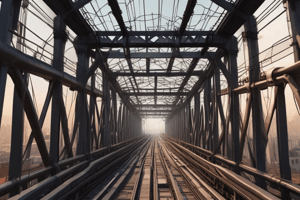Podcast
Questions and Answers
What must be true for axial deformation to occur?
What must be true for axial deformation to occur?
- The load must be unevenly distributed.
- The bar must have a uniform cross-sectional area. (correct)
- The material must be at its ultimate strength.
- The stress can exceed the proportional limit.
What describes the elastic limit of a material?
What describes the elastic limit of a material?
- The point where stress and strain are no longer proportional.
- The threshold where the material begins to yield without load increase.
- The maximum stress causing permanent deformation. (correct)
- The load beyond which the material returns to original shape.
Which point indicates a significant plastic deformation without any increase in load?
Which point indicates a significant plastic deformation without any increase in load?
- Yield point. (correct)
- Proportional limit.
- Elastic limit.
- Ultimate strength.
What is the maximum stress that can be developed without causing permanent deformation?
What is the maximum stress that can be developed without causing permanent deformation?
What is stiffness a measure of?
What is stiffness a measure of?
What characterizes a column in aircraft construction?
What characterizes a column in aircraft construction?
Which type of deformation does not alter an element's length but affects its shape?
Which type of deformation does not alter an element's length but affects its shape?
What term is used for the maximum strength of a material at the point of rupture?
What term is used for the maximum strength of a material at the point of rupture?
Which of the following statements about statically indeterminate structures is true?
Which of the following statements about statically indeterminate structures is true?
What is the main purpose of the polar moment of inertia in structural analysis?
What is the main purpose of the polar moment of inertia in structural analysis?
What is shear strain associated with in a rectangular element?
What is shear strain associated with in a rectangular element?
How is internal stability defined in the context of trusses?
How is internal stability defined in the context of trusses?
What does the Parallel Axis Theorem help to calculate?
What does the Parallel Axis Theorem help to calculate?
In the context of truss analysis, what defines a stable truss?
In the context of truss analysis, what defines a stable truss?
What are typical shapes of ties used in aircraft construction?
What are typical shapes of ties used in aircraft construction?
Which property describes the centroidal moment of inertia?
Which property describes the centroidal moment of inertia?
What effect does aerodynamic twist have on an aircraft's roll during banked turns?
What effect does aerodynamic twist have on an aircraft's roll during banked turns?
What characteristics define Dutch Roll in aircraft?
What characteristics define Dutch Roll in aircraft?
How is wing incidence defined if the wing is twisted?
How is wing incidence defined if the wing is twisted?
What is the primary role of wing vertical location in aircraft design?
What is the primary role of wing vertical location in aircraft design?
What is the effect of a smoothly-rounded wing tip?
What is the effect of a smoothly-rounded wing tip?
What is the significance of the wing incidence angle chosen for aircraft?
What is the significance of the wing incidence angle chosen for aircraft?
How does cut-off forward swept wing design benefit supersonic aircraft?
How does cut-off forward swept wing design benefit supersonic aircraft?
What happens to the torsional load with a mid-wing design located at the trailing edge?
What happens to the torsional load with a mid-wing design located at the trailing edge?
What is the main purpose of wing flaps in aircraft?
What is the main purpose of wing flaps in aircraft?
What is aileron reversal in high-speed aircraft?
What is aileron reversal in high-speed aircraft?
Which control surface is commonly used to augment roll control in jet transports at low speeds?
Which control surface is commonly used to augment roll control in jet transports at low speeds?
What technique is used to minimize flutter tendencies in aircraft?
What technique is used to minimize flutter tendencies in aircraft?
What does mass balancing in aviation refer to?
What does mass balancing in aviation refer to?
What is the main purpose of lofting in aircraft design?
What is the main purpose of lofting in aircraft design?
What phenomenon can occur if the wing twists excessively at speed?
What phenomenon can occur if the wing twists excessively at speed?
What is production lofting in aircraft design?
What is production lofting in aircraft design?
What is the primary benefit of using a pusher configuration in aircraft design?
What is the primary benefit of using a pusher configuration in aircraft design?
How does a constant speed propeller maintain optimal engine performance?
How does a constant speed propeller maintain optimal engine performance?
What distinguishes a controllable-pitch propeller from a variable-pitch propeller?
What distinguishes a controllable-pitch propeller from a variable-pitch propeller?
What is the theoretical optimal pressure recovery of an isentropic ramp inlet?
What is the theoretical optimal pressure recovery of an isentropic ramp inlet?
What is the function of the spinner in a propeller system?
What is the function of the spinner in a propeller system?
What effect do oblique shocks have on pressure recovery in an aircraft engine?
What effect do oblique shocks have on pressure recovery in an aircraft engine?
What is a major advantage of a variable-pitch propeller?
What is a major advantage of a variable-pitch propeller?
What is a primary concern when designing down-draft cooling systems for aircraft?
What is a primary concern when designing down-draft cooling systems for aircraft?
Flashcards are hidden until you start studying
Study Notes
Statically Indeterminate Structures
- External reactions cannot be calculated solely using the static equations of equilibrium.
Section Properties
- Area: The cross-sectional area of a structural member.
- Center of Gravity: The point where the entire weight of an object can be considered to act.
- Moment of Inertia: A measure of a body's resistance to bending.
- Radius of Gyration: The distance from the axis of rotation to a point where the entire mass of the body can be considered to be concentrated.
- Polar Moment of Inertia: A measure of a body's resistance to torsion.
- Centroidal Moment of Inertia: The moment of inertia calculated with respect to an axis passing through the centroid of the object.
- Parallel Axis Theorem: A theorem used to calculate the moment of inertia of an object about an axis that is parallel to an axis passing through its centroid.
Strength of Materials
- Column: A structural member designed to resist axial compressive loads.
- Tie: A structural member designed to resist axial tensile loads.
- Truss: A structure composed of interconnected straight members that are joined together at their ends.
- External Stability: A truss is externally stable if the reactions are not all parallel or concurrent.
- Internal Stability: A truss is internally stable if the number of members (m) plus 3 equals the number of unknown reactions (R) plus twice the number of joints (j): m + 3 = R + 2j.
- Truss Support: The way a truss is supported and connected to the ground or other structures.
Truss Analysis
- A truss is a structure composed entirely of two-force members.
Axial Deformation
- The load must be axial (applied along the length of the member).
- The bar must have a uniform cross-sectional area.
- The stress must not exceed the proportional limit.
Stress-Strain Diagram
- Proportional Limit: The point on the stress-strain diagram where stress is directly proportional to strain (Hooke's Law).
- Elastic Limit: The point beyond which the material will not return to its original shape when the load is removed.
- Yield Point: The point where the material will elongate significantly without an increase in load.
- Ultimate Strength: The maximum stress value on the stress-strain diagram.
- Rapture Strength: The strength of the material at rupture.
- Stiffness: The ratio of the force acting on an elastic body to the resulting displacement.
Shearing Deformation
- An element subject to shear undergoes a change in shape without a change in length.
- Shear Strain: The change in angle at the corner of an originally rectangular element.
Biaxial Deformation
- Deformation occurring in two dimensions.
Triaxial Deformation
- Deformation occurring in three dimensions.
Wing Twist
- The angle between the wing's chord line at the root and the chord line at the tip.
- Aerodynamic twist can occur even without geometric twist.
- Wing sweep provides an effective dihedral, which reduces the Dutch Roll tendency.
Wing Incidence
- The angle between the wing's chord line and the fuselage axis.
- The angle is chosen to minimize drag at a specific operating condition, usually cruise.
Wing Vertical Location
- High Wing: The wings are mounted on top of the fuselage.
- Mid Wing: The wings are mounted at the middle of the fuselage.
- Low Wing: The wings are mounted at the bottom of the fuselage.
Wing Tips
- A smoothly-rounded tip facilitates airflow around the tip.
- Wingtips with a sharp edge (as seen nose-on) reduce induced drag and control force.
High Lift Devices
- Flaps: Extend from the trailing edge of the wing to increase lift, usually during landing.
- Spoilers: Control surfaces that disrupt the airflow over the wing, reducing lift and increasing drag.
- Aileron Reversal: A high-speed phenomenon where the aileron load twists the wing, potentially causing the aircraft to roll in the opposite direction intended.
- Auxiliary Ailerons: Ailerons located inboard that help with high-speed roll control.
- Mass Balancing: The addition of weight ahead of the control surface hinge line, counteracting the weight behind the hinge and minimizing flutter tendencies.
- Aerodynamic Balancing: The use of control surface shape and design to minimize flutter.
- Biplane Wings: Wings that are mounted in two layers one above the other.
CONFIGURATION LAYOUT & LOFT
- Inboard Profile Drawing: A detailed drawing of the aircraft showing the internal arrangement of subsystems.
- Lofting: The process of precisely defining the aircraft's external geometry.
- Production Lofting: The most detailed form of lofting, providing an exact mathematical definition of the entire aircraft.
Fuselage Loft Verification
- Buttock-plane Cuts: A process to verify the fuselage loft definition by intersecting the aircraft with vertical planes.
Propeller Types
- Fixed-Pitch Propeller: A propeller where the pitch cannot be adjusted by the pilot.
- Variable-Pitch Propeller: A propeller where the pitch can be changed by the pilot to improve thrust across a range of speeds.
- Controllable-Pitch Propeller: A propeller where the pitch is directly controlled by the pilot through a lever.
- Constant Speed Propeller: A propeller with automatic pitch control to maintain optimal engine RPM.
- Spinner: A streamlined cover that is placed over the propeller hub to decrease drag.
Down-Draft Cooling
- A cooling system where engine exhaust exits the air beneath the fuselage, a high-pressure area, leading to less efficient cooling.
- Pusher Configuration: Placing the engine behind the wings, which can reduce aircraft skin friction drag, wetted area, and cabin noise.
Studying That Suits You
Use AI to generate personalized quizzes and flashcards to suit your learning preferences.




